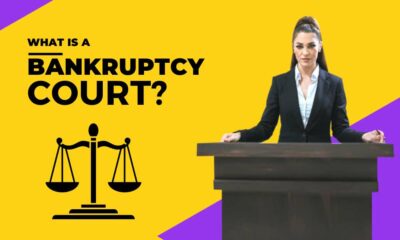Credit Score
How Unemployment Affects Credit Scores

There are many reasons why people might have low credit scores. One is due to being unemployed for a long time. This can negatively impact credit scores because it becomes harder to pay bills. In the United States, over 4 million people have problematic credit scores.
There is a connection between unemployment and credit scores. People with low credit scores peoples tend to have less well-paying jobs. They also have less job stability. Additionally, research shows that people with problematic credit scores are more likely to be without insurance and make higher debt payments.
This is not all: people with less than perfect credit scores often end up in debt or even bankruptcy. They are also more likely to be unemployed for longer periods of time.
How Do Layoffs Affect Credit Scores?
The last thing on your mind if you’ve recently been laid off is how this temporary situation will affect your credit report. There is both good news and negative news. First, the good news: Your absence from work will not negatively affect your credit score. Your credit rating may worsen if you lack the funds to cover your expenses, which is dreadful news. Examine each one in greater detail.
Your credit report includes a variety of personal information, such as your name, SSN, and address. If you leave your work for a brief period of time, this information will not appear on your credit report, so lenders will be unaware of your financial issues. However, your credit report may contain a list of former employers without dates.
Does Employment History Count?
Unemployment benefits aren’t reported on credit reports. Your income won’t be reflected on your credit report, regardless of your work status.
Your ability to pay your debts will typically drop if your income decreases dramatically (save in rare cases where some people have received more money than they lost under the 2020 CARES Act). If you are routinely late with payments to lenders and credit card issuers, your credit score may suffer.
How Credit Scores are Determined
35 percent of your credit score is based on your payment history, therefore making payments on time is crucial (no later than 30 days from the due date). One late payment is all it takes to knock you out of your current position of good credit, so be careful if your credit score has been good up to this point. The requirements of the CARES Act do not exempt late payments attributable to the Covid-19 pandemic (whether or not they would be counted against you).
Your credit score is partially determined by how responsibly you use your credit cards. If you employ credit cards to make up for a lack of income, your credit utilization could rise. The credit utilization ratio indicates the proportion of available credit utilized with each creditor. As a general rule, you should keep your credit utilization below 30%, and preferably below 10%. Your credit utilization rises as your credit card usage increases. It is unwise to max out multiple credit cards.
Establishing New Credit Lines
Opening new credit lines could harm your credit score. For instance, the credit scoring algorithm responds favorably to new credit accounts (10% of the total score), but only to a certain extent. Every time you apply for a new credit card, inquiries into your credit history could reduce your score by two to five points. As a result of new credit, the average age of your credit lines accounts for 15% of your credit score.
Credit Cards and Unemployment
Yes, you can apply for credit even when unemployed. On the other hand, creditors and credit card companies will ask you to list your income on the application. In order to obtain a mortgage, whether it’s a home equity line of credit or a refinance, you must submit proof of income. If you have excellent credit and a substantial down payment, credit card companies, and auto lenders will not often want evidence of income.
Even if you have stable work, it may not be in your best interest to take on additional financial obligations if you are already struggling to meet your present expenses.
Obtaining a personal loan from a credit union may be a possibility if you are having trouble paying your bills and really need more income to get through this difficult period. Credit unions provide more lenient credit standards and lower rates of interest. If this is not possible, the best way to regain financial stability is to create a budget and reduce expenditure.
Conclusion
Unemployment can have a negative impact on your credit score. The more you work, the better it is for your credit score. The higher your income, the better it is for your credit score. The unemployed are more likely to be late on payments and have a higher chance of defaulting on their loans. Unemployment can affect a person’s ability to get new loans and can even lead to bankruptcy.
Consumer Credit Counseling Services help to reduce the amount of debt you are carrying by teaching budgeting and spending techniques that can help you avoid overspending. They also work with credit card companies to lower interest rates and fees for those struggling with debt. Research has shown that a person’s credit history is positively related to their lifetime income.
-

 Credit Score3 years ago
Credit Score3 years agoWhy Do Credit Scores Drop After Acquiring a New Credit Card?
-

 Credit Repair2 years ago
Credit Repair2 years agoHow to Remove Credit Inquiries from Credit Report
-

 Financial advice2 years ago
Financial advice2 years agoHow to Break a Lease Without Ruining Your Credit
-

 Credit Repair2 years ago
Credit Repair2 years agoHow to Fix an Eviction on My Credit Report
-

 Financial advice3 years ago
Financial advice3 years agoGetting Pre-Approved for a Home Loan-The Ins and Outs
-

 Credit Repair2 years ago
Credit Repair2 years agoSmart Credit Repair After Divorce
-

 Financial Services2 years ago
Financial Services2 years agoWhat Can You Expect in a Bankruptcy Court?
-

 Financial advice3 years ago
Financial advice3 years agoThe Pros and Cons of Buy Now Pay Later Deals











